Artificial Intelligence Question Bank with Answers : part 2
Vellore Institute of Technology, Vellore campus
Artificial Intelligence Question Bank with Answers : part 1 link click here
Q10.Write the steps of Breadth-first search (BFS) algorithm.
Q10 Answer: Breadth-first-search Algorithm :
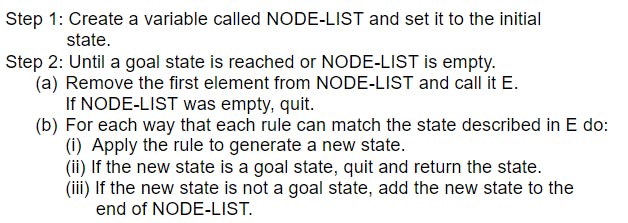
Q11.Write the steps of Depth-first search (DFS) algorithm.
Q11 Answer: Depth-first-search Algorithm :
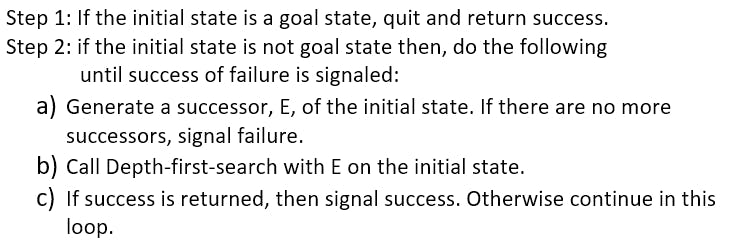
Q12.Solve the following water jug problem using BFS and DFS algorithms: You are given two jugs, 4-litre one and 3-litre one. Neither has any measuring marks on it. There is a pump that can be used to fill the jugs with water. How can we get exactly 2 litres of water into 4-litre jug?
Q12 Answer:
The state space for this problem can be described as the set of ordered pairs of integers (x,y) such that x=0,1,2,3 or 4 and y=0,1,2 or 3. Here x represents the number of litres of water in the 4-litre jug. and y represents the number of litres of water in the 3-litre jug.
The start state or initial state = (0,0)
The goal state = (2,y)
Solution using BFS Algorithm:
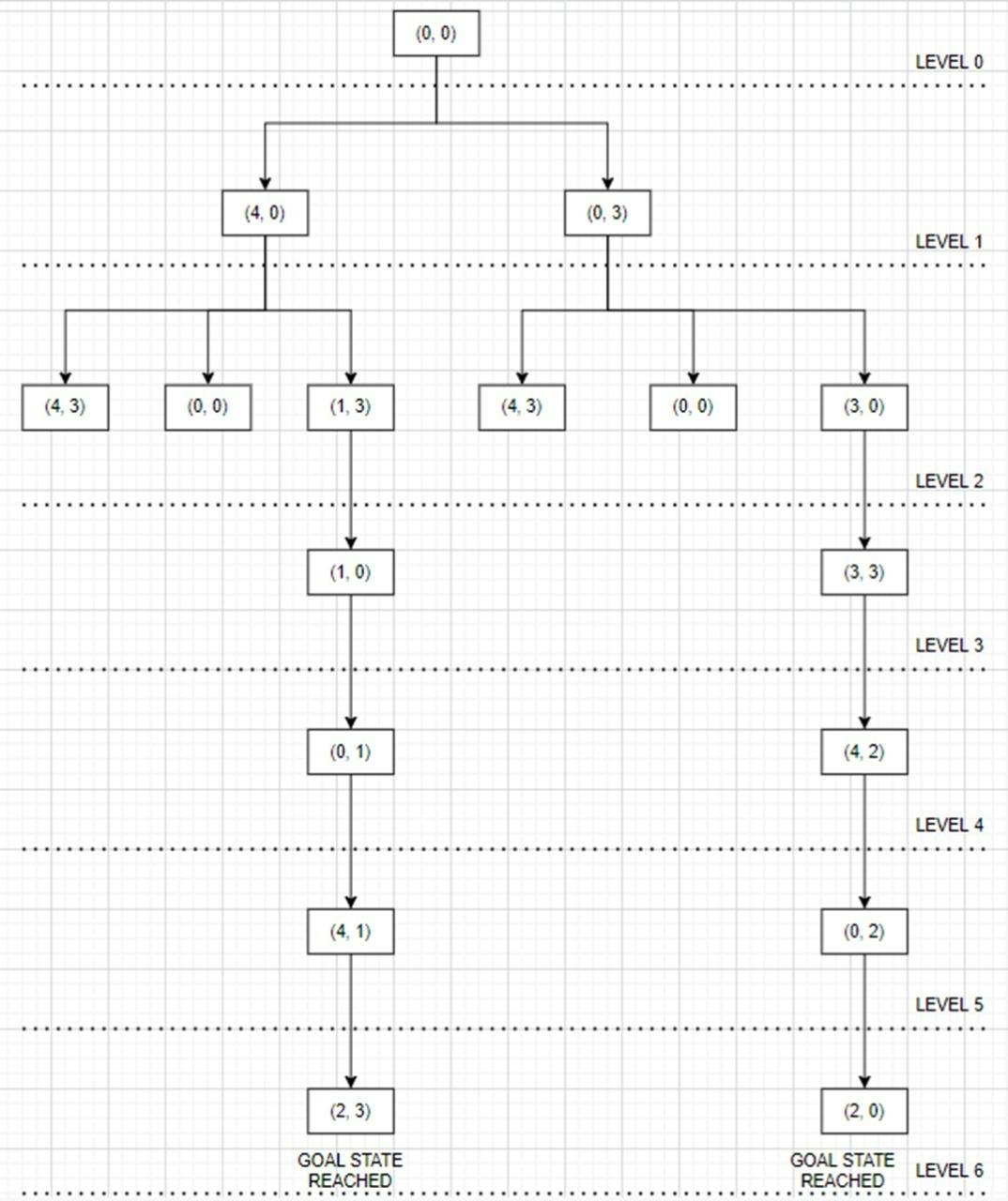
Solution using DFS Algorithm:
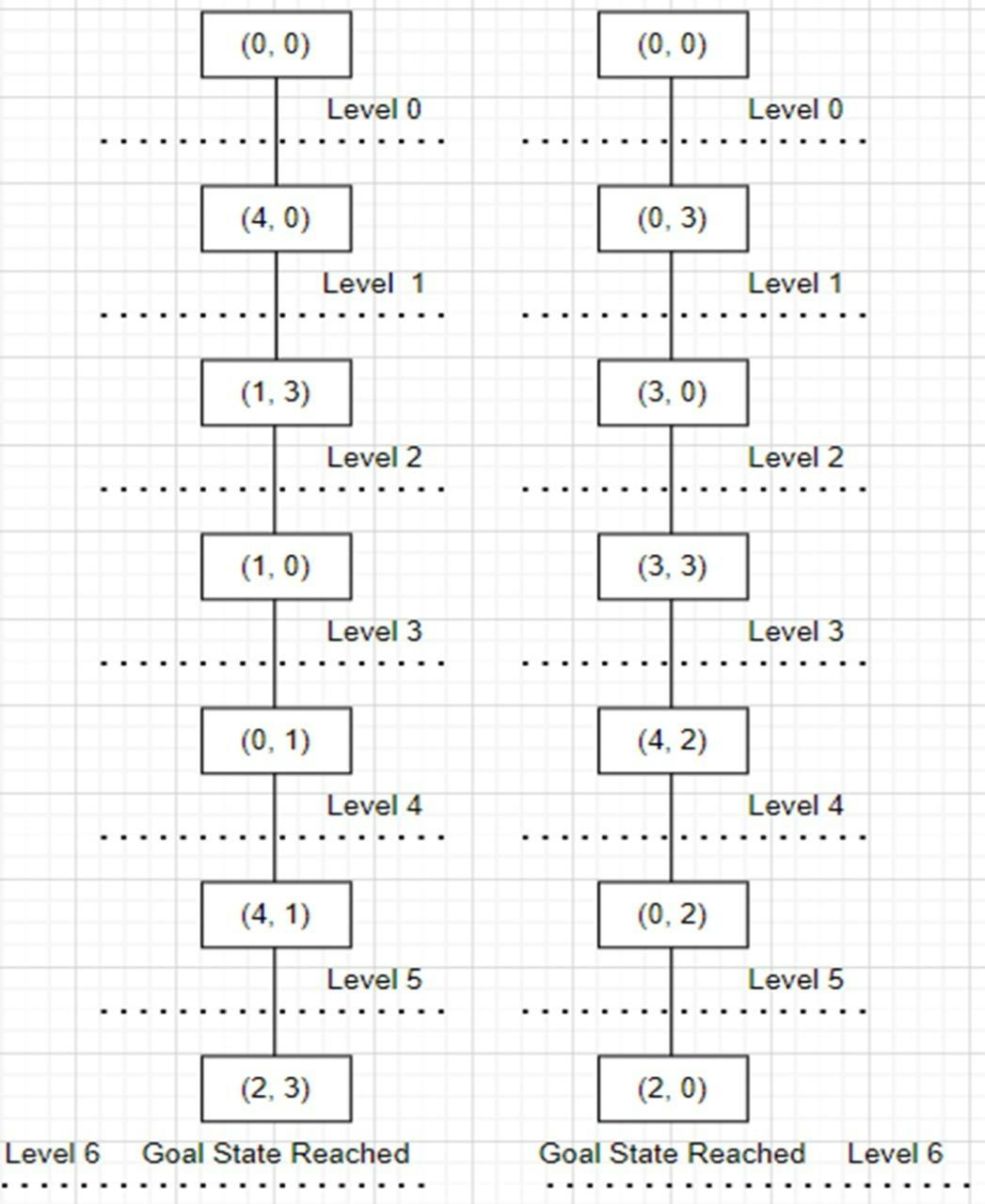
Q13.Solve the following water jug problem using BFS and DFS algorithms: You are given two jugs, 4-litre one and a 3-litre one. Neither has any measuring marks on it. There is a pump that can be used to fill the jugs with water. How can we get exactly 2 litres of water into 3-litre jug?
Q13 Answer:
The state space for this problem can be described as the set of ordered pairs of integers (x,y) such that x=0,1,2,3 or 4 and y=0,1,2 or 3. Here x represents the number of litres of water in the 4-litre jug. and y represents the number of litres of water in the 3-litre jug.
The start state or initial state = (0,0)
The goal state = (x,2)
Solution using BFS Algorithm:
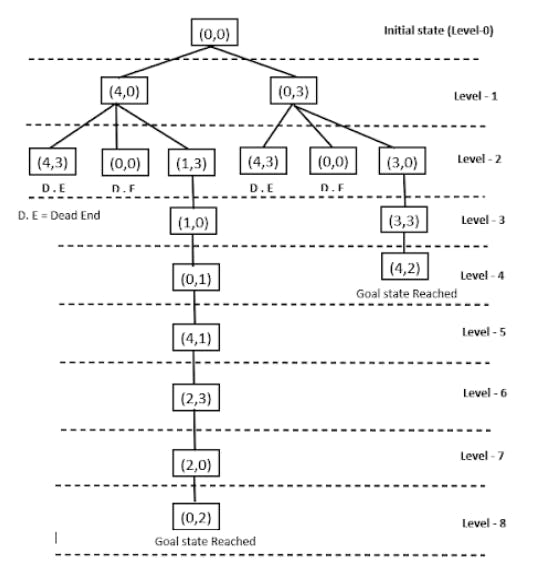
Solution using DFS Algorithm:
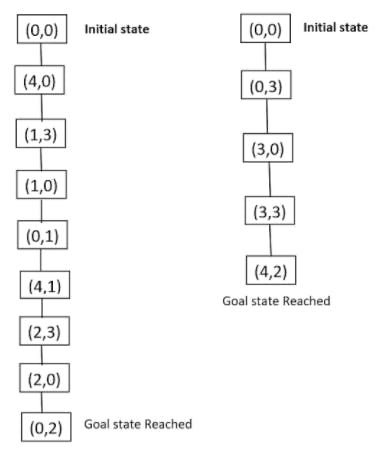
Q14.Solve the following water jug problem using BFS and DFS algorithms: You are given two jugs, 4-gallon one and 3-gallon one. Neither has any measuring marks on it. There is a pump that can be used to fill the jugs with water. How can we get exactly 2 gallons of water into 4-gallon jug? Q14 Answer:
The state space for this problem can be described as the set of ordered pairs of integers (x,y) such that x=0,1,2,3 or 4 and y=0,1,2 or 3. Here x represents the number of gallons of water in the 4-gallon jug. and y represents the number of gallons of water in the 3-gallon jug.
The start state or initial state = (0,0)
The goal state = (2,y)
Solution using BFS Algorithm:
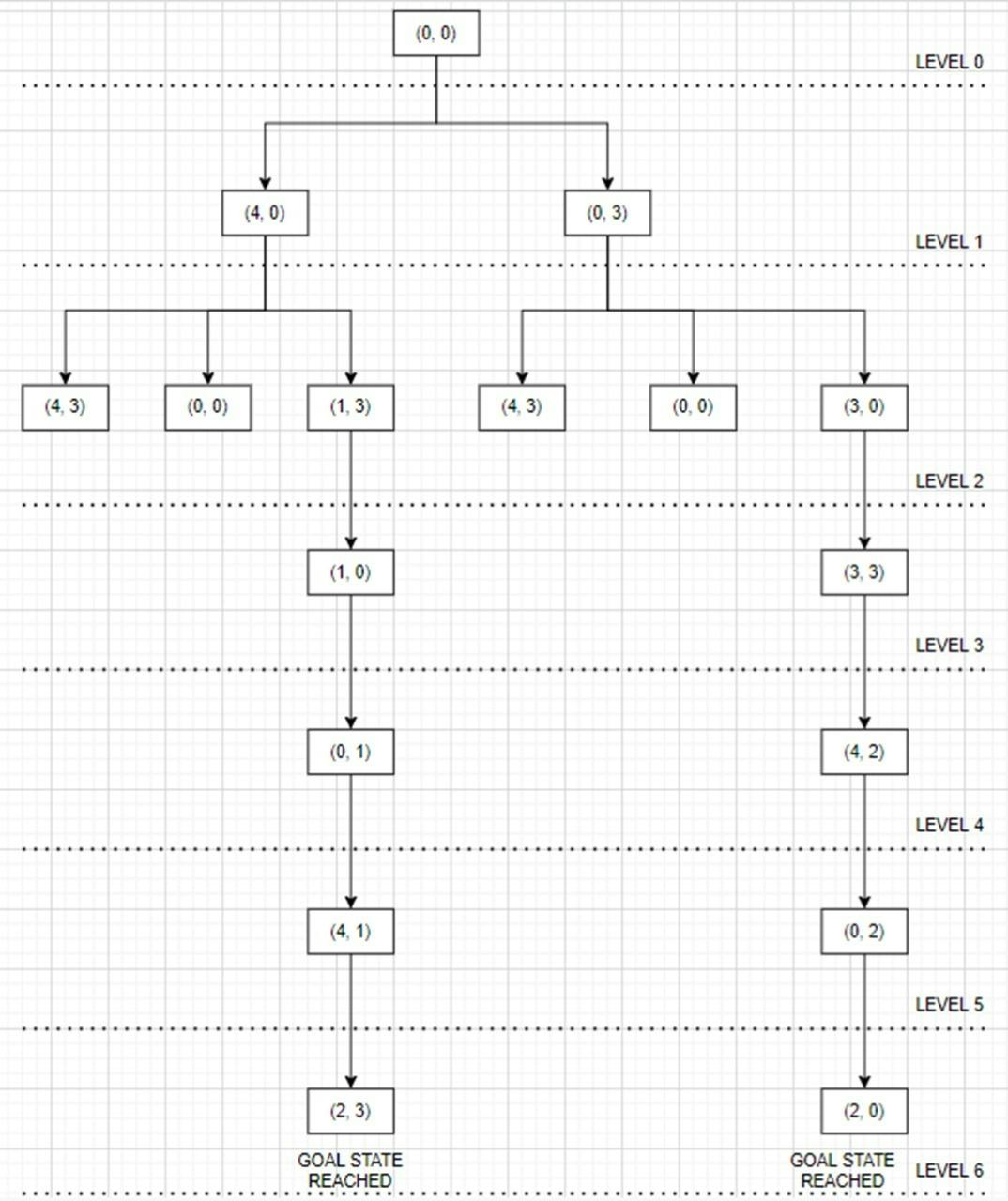
Solution using DFS Algorithm:
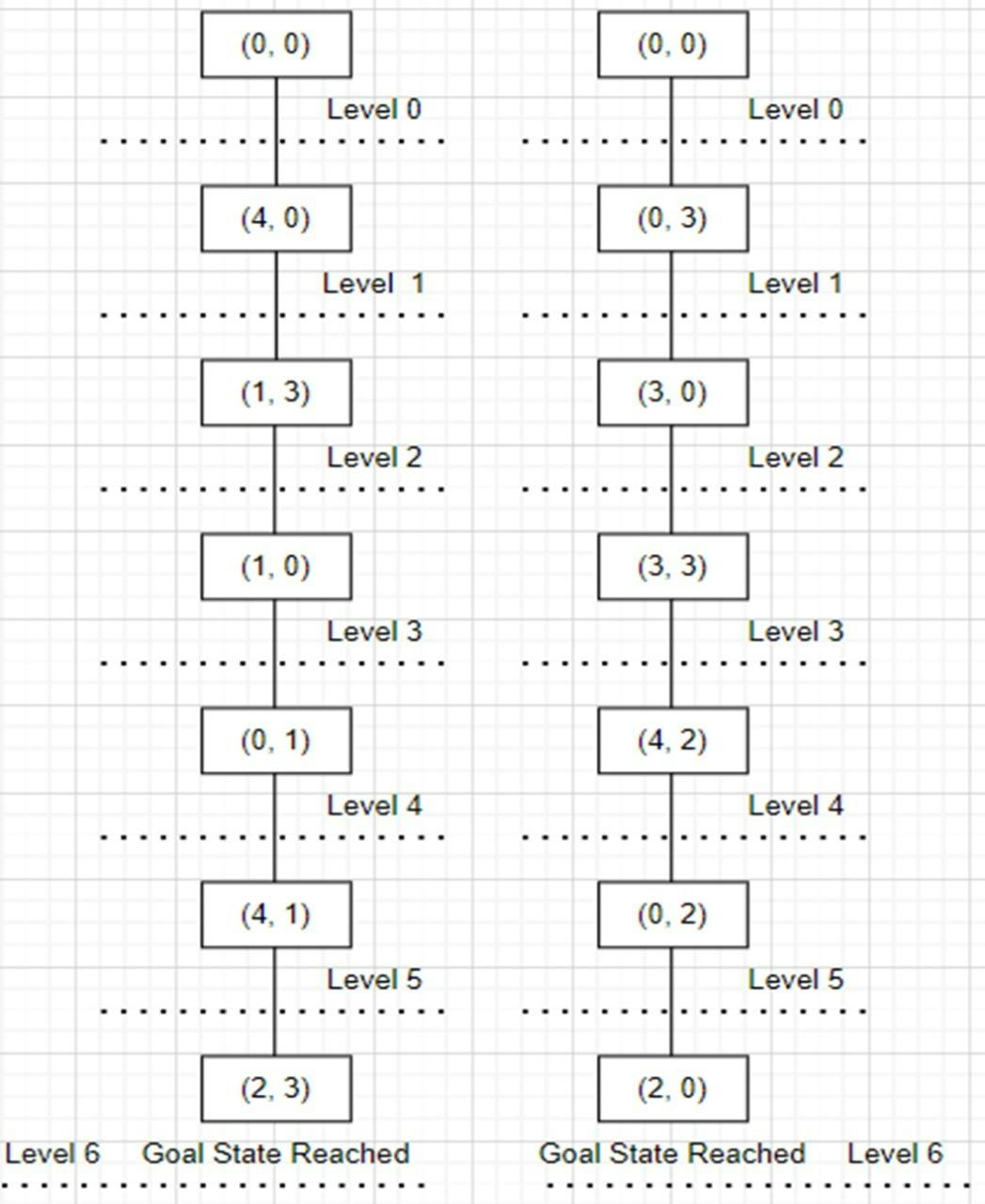
Q15.Solve the following water jug problem using BFS and DFS algorithms: You are given two jugs, 4-gallon one and 3-gallon one. Neither has any measuring marks on it. There is a pump that can be used to fill the jugs with water. How can we get exactly 2 gallons of water into 3-gallon jug?
Q15 Answer:
The state space for this problem can be described as the set of ordered pairs of integers (x,y) such that x=0,1,2,3 or 4 and y=0,1,2 or 3. Here x represents the number of gallons of water in the 4-gallon jug. and y represents the number of gallons of water in the 3-gallon jug.
The start state or initial state = (0,0)
The goal state = (x,2)
Solution using BFS Algorithm:
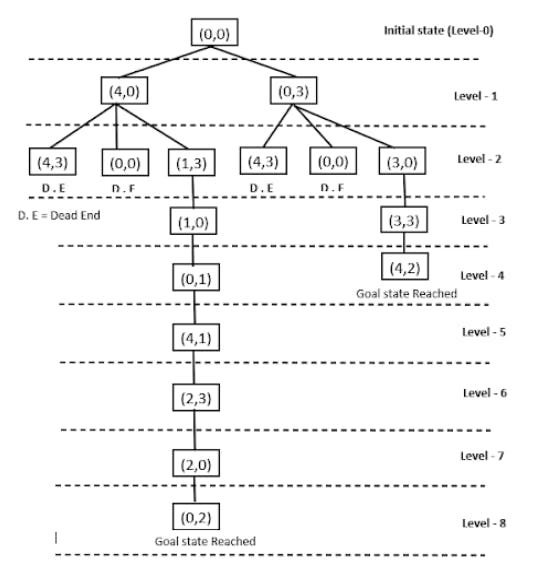
Solution using DFS Algorithm:
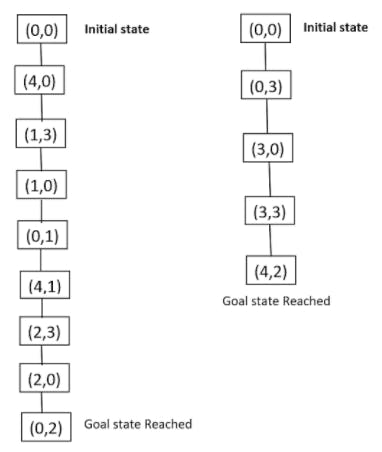 Q16.Solve the following water jug problem using BFS and DFS algorithms:
You are given two jugs, 6-litre one and a 5-litre one. Neither has any measuring marks on it. There is a pump that can be used to fill the jugs with water. How can we get exactly 2 litres of water into 6-litre jug?
Q16.Solve the following water jug problem using BFS and DFS algorithms:
You are given two jugs, 6-litre one and a 5-litre one. Neither has any measuring marks on it. There is a pump that can be used to fill the jugs with water. How can we get exactly 2 litres of water into 6-litre jug?
Q16 Answer:
The state space for this problem can be described as the set of ordered pairs of integers (x,y) such that x=0,1,2,3,4,5 or 6 and y=0,1,2,3,4 or 5. Here x represents the number of litres of water in the 6-litre jug. and y represents the number of litres of water in the 5-litre jug.
The start state or initial state = (0,0)
The goal state = (2,y)
Solution using BFS Algorithm:
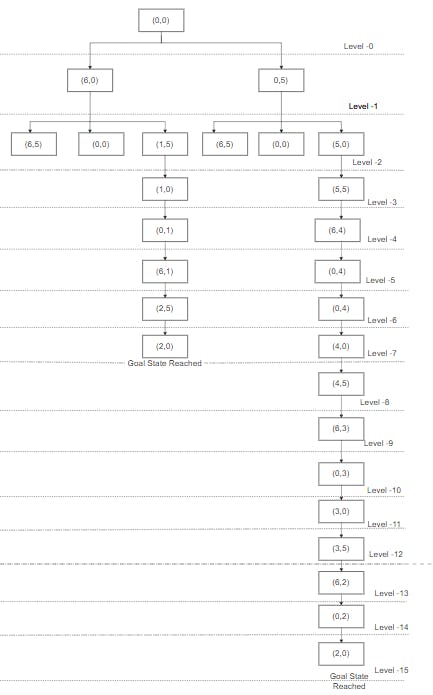
Solution using DFS Algorithm:
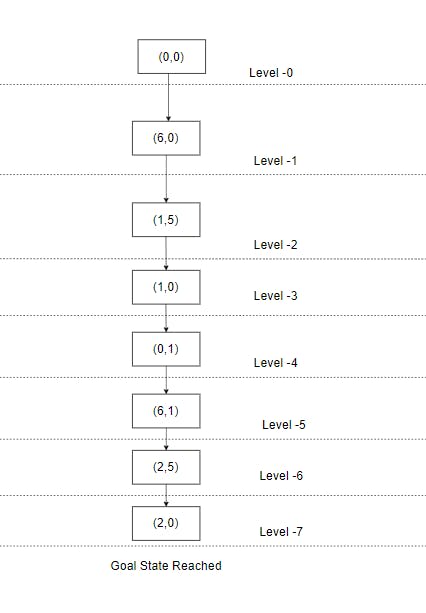
Q17.Solve the following Water jug problem using BFS and DFS algorithm: you are given two jugs, 6-litre one and 5-litre one, Neither has any measuring marks on it. There is a pump that can be used to fill the jugs with water. How exactly can you get 2 litres of water into a 5-litre jug?
Q17 Answer :
The state space for this problem can be described as set of ordered pairs of integers (x,y) such that x=0,1,2,3,4,5,6 and y=0,1,2,3,4 or 5 Here, x represents the amount of water in the 6-litre jug and y represents the amount of water in the 5-litre jug.
The Start state or Initial state=(0,0)
The Goal state=(x,2)
Solution using BFS Algorithm:
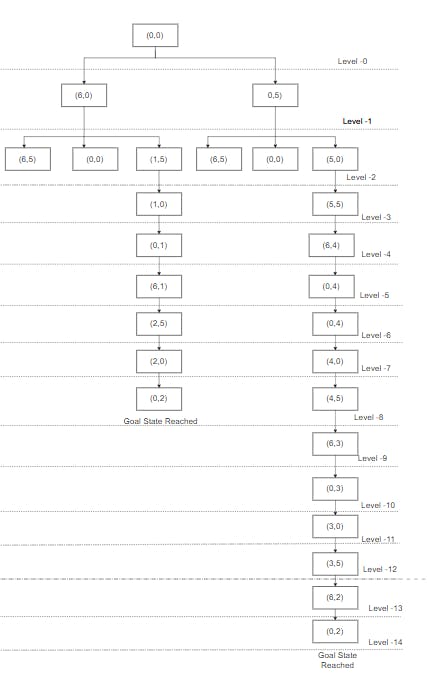
Solution using DFS Algorithm:
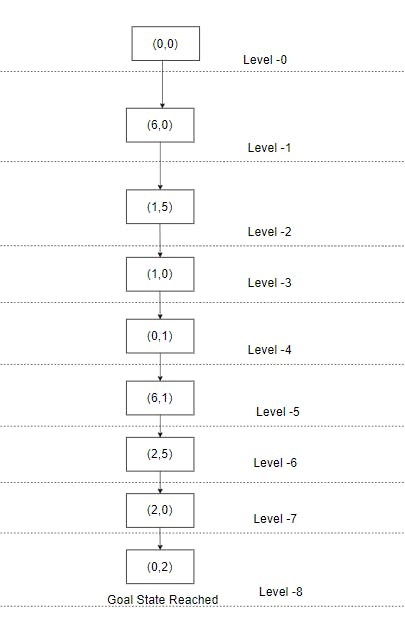
Q18.Solve the following Water jug problem using BFS and DFS algorithm: you are given two jugs, 6-gallon one and 5-gallon one, Neither has any measuring marks on it. There is a pump that can be used to fill the jugs with water. How exactly can you get 2 gallons of water into a 6-gallon jug?
Q18 Answer :
The state space for this problem can be described as set of ordered pairs of integers (x,y) such that x=0,1,2,3,4,5,6 and y=0,1,2,3,4 or 5. Here, x represents the amount of water in the 6-gallon jug and y represents the amount of water in the 5-gallon jug.
The Start state or Initial state=(0,0)
The Goal state=(2,y)
Solution using BFS Algorithm:
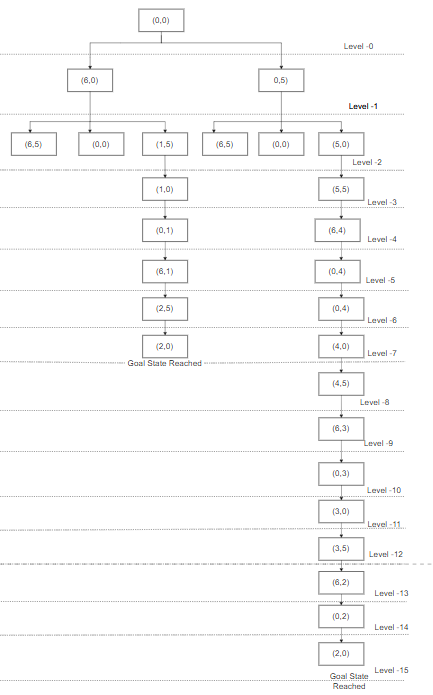
Solution using DFS Algorithm:
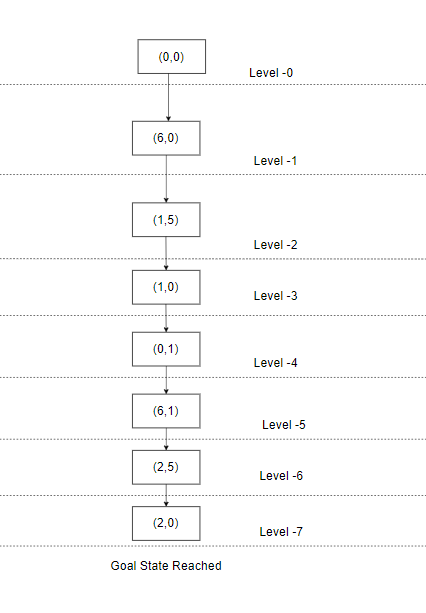
Q19.Solve the following Water jug problem using BFS and DFS algorithm: you are given two jugs, 6-gallon one and 5-gallon one, Neither has any measuring marks on it. There is a pump that can be used to fill the jugs with water. How exactly can you get 2 gallons of water into a 5-gallon jug?
Q19 Answer :
The state space for this problem can be described as set of ordered pairs of integers (x,y) such that x=0,1,2,3,4,5 or 6 and y=0,1,2,3,4 or 5. Here, x represents the amount of water in the 6-gallon jug and y represents the amount of water in the 5-gallon jug.
The Start state or Initial state=(0,0)
The Goal state=(x,2)
Solution using BFS Algorithm:
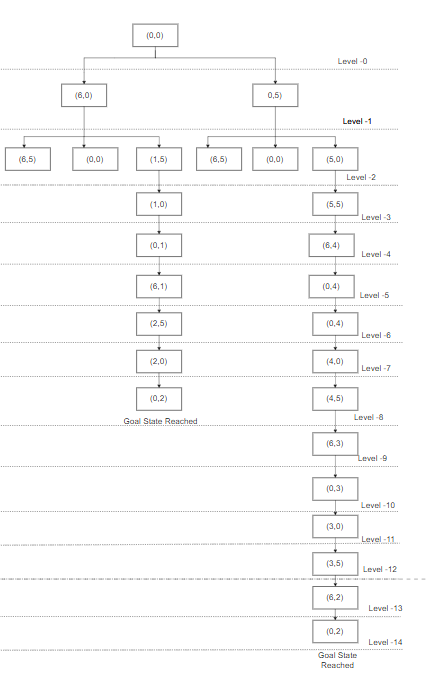
Solution using DFS Algorithm:
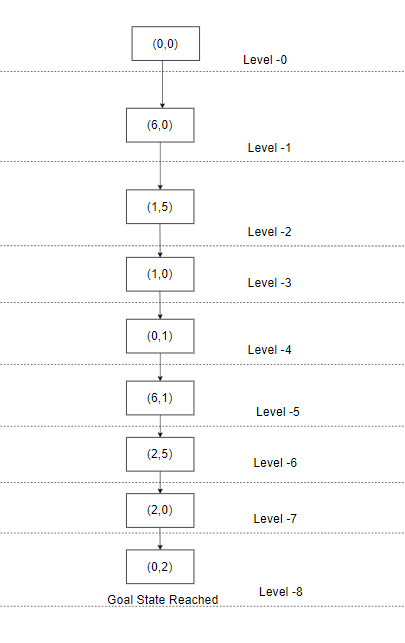
Artificial Intelligence Question Bank with Answers: part 3 click here
